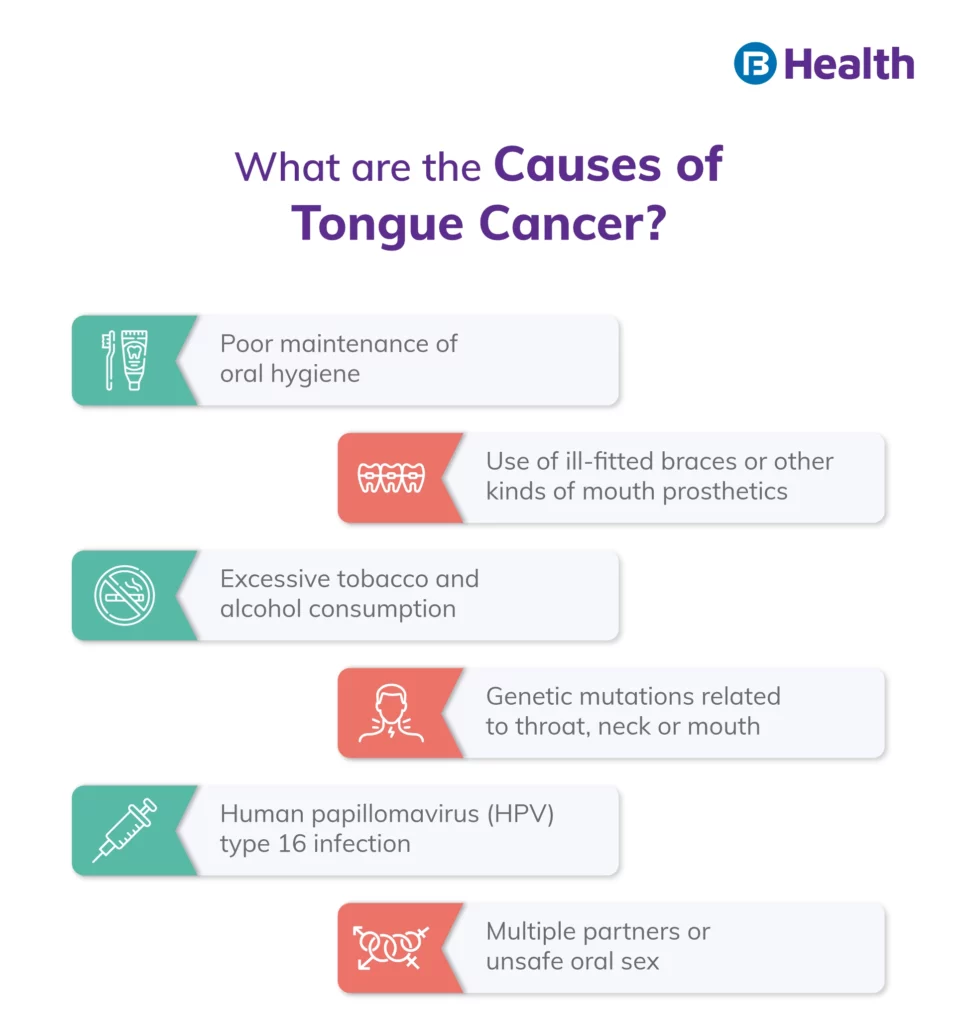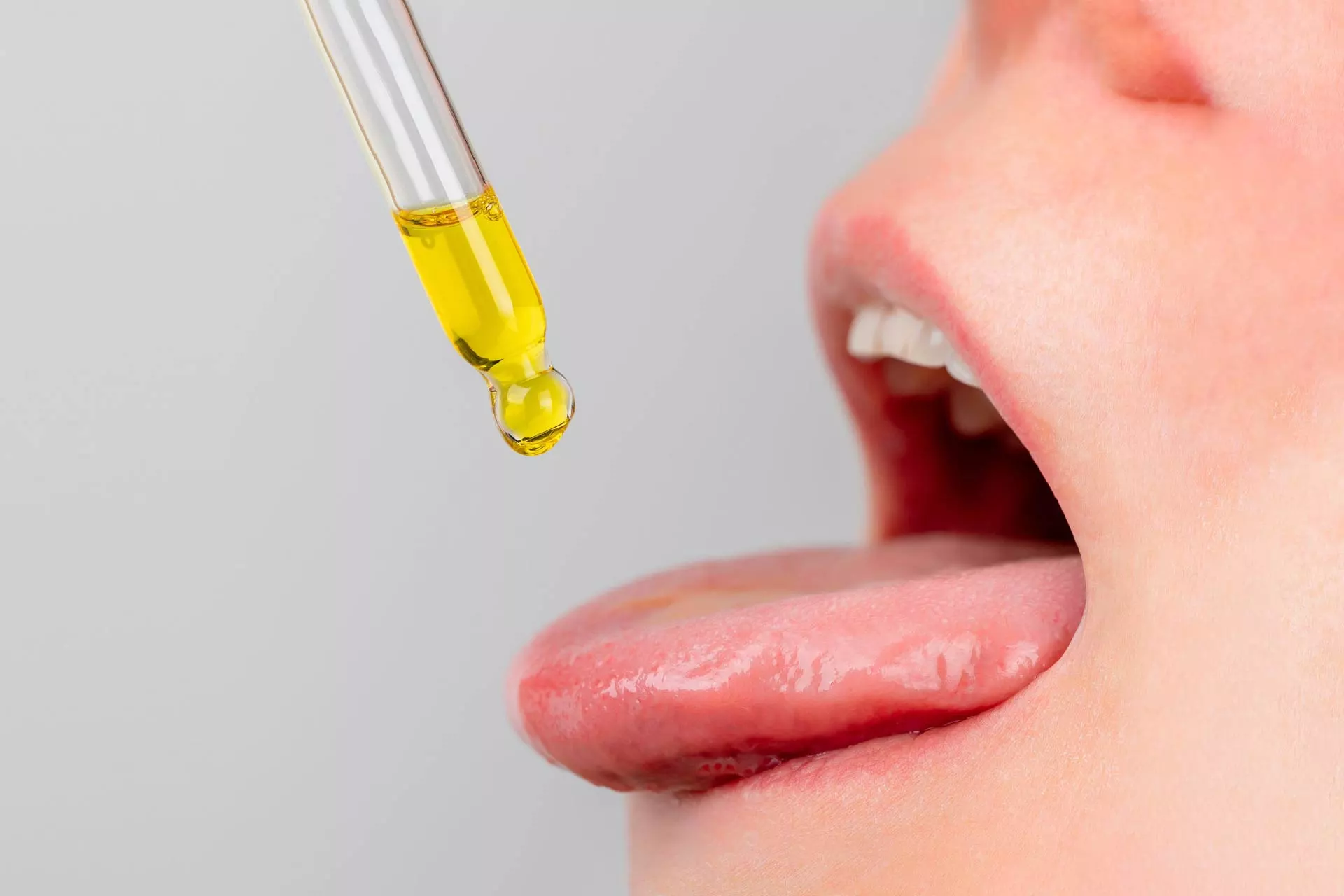Cancer | 7 min read
Tongue Cancer: Means, Early Symptoms, Complications, Treatment
Medically reviewed by
Table of Content
Synopsis
Tongue cancer falls under head and neck cancer, causing lesions on the surface or the base of the tongue. It occurs due to the uncontrolled growth of cells in the tongue. Generally, its occurrence is quite rare and primarily affects adults.
Key Takeaways
- Tongue cancer results in painful lesions on the tongue and can cause difficulty in eating
- Tongue cancer treatment involves combinatorial surgery, radiation, and chemotherapy
- Tongue cancer affects older individuals, primarily those aged above 40
What is Tongue Cancer?
Tongue cancer is a head and neck cancer arising from the continuous division of the flat squamous cells lining the tongue's surface. In scientific terms, it is called squamous cell carcinoma, i.e., cancer forming in the epithelial tissues that line organs. It originates as a white patch that may seem like a chronic ulcer but eventually grows into a reddish lesion after the growth and proliferation of cells. It is among the first tongue cancer stages to exhibit.The chances of developing tongue cancer are more common among older age groups, typically in 40+ year-olds. In addition, males are more prone to tongue cancer than women or children.
Oral cancer can be fatal if not diagnosed at an early stage. The survival rate was 84% when localised cancer was diagnosed, compared to 66% after it had metastasised to lymph nodes. [1]
Treatment options depend on the extent of the cancer spread, the size of the tumour, and its location. Tongue cancer treatment, like most other cancers, is usually a combination of surgery for the excision of the lump, radiation therapy, and chemotherapy. If early-stage tongue cancer is detected, there are high chances of getting cured.
Additional Read: Types of Cancer
Tongue Cancer Early Signs and Symptoms
Tongue cancer symptoms comprise lumps or lesions and are subject to pain, burning sensation, and, at times, bleeding. Early-stage tongue cancer symptoms include ear pain, a sore throat or lumps that do not heal quickly.Oral cancers are characterised by the following:
- Pink/red/white lesions along the edge of the tongue that can often bleed due to being jabbed by the teeth or food.
Oropharyngeal cancers are characterised by the following:
- Lumps at the back of the mouth can cause difficulty in swallowing
- A constant full sensation in the throat
- Plausible changes in voice and throat ache
- It is more difficult to detect this type of cancer than oral cancer, as it is hidden from plain sight and becomes noticeable only after the tumour has grown significantly
Tongue Cancer Causes
Even though there is no such established genetic predisposition to tongue cancer, a handful of factors increase the susceptibility to the disease. Listed below are the most common tongue cancer causes:Human papillomavirus (HPV) infection:
HPV infection, precisely HPV type 16, has been linked to many cases of Oropharyngeal cancers. The number of instances of this connection is more common among those with multiple sex partners and those who engage in unprotected oral sex. However, this type of cancer responds better to radiation and chemotherapy. HPV can also cause cervical cancer.
Tobacco usage:
The higher your exposure to any form of tobacco, the more prone you are to getting head and neck cancer. Studies have repeatedly proven that those who do not smoke are way less predisposed to developing oral cancer than those who do.
Alcohol consumption: This has also proven to be a risk factor for tongue cancer.
Gender:
It is more common for men to develop this cancer owing to more rigorous usage of tobacco, betel nut, spices and alcohol.
Poor nutrition:
Diets poor in fibre and nutritious value tend to increase the chances of tongue cancer.
Poor hygiene:
Ill-fitted braces or dentures, lack of oral hygiene, and jagged teeth can also trigger the formation of malignant ulcers.
Genetic factors: Mutations in certain genes give rise to conditions which increase the chances of getting tongue cancer.
- Individuals with Fanconi anemia are at a high risk of throat and mouth cancer. [2]
- Dyskeratosis congenita can lead to people developing head and neck cancers at an early age. [3]
Tongue Cancer Types
Depending on the location of the cancer formation, tongue cancer can be classified as:
Oral cancer
This affects the front portion of the tongue, typically the part that sticks out of the mouth. Oral cancer is easier to diagnose due to its prominent location, and thus, easier to be treated and cured faster.
Oropharyngeal cancers
This emerges at the base of the tongue, where it attaches to the throat. Due to its hidden nature, detecting this type of cancer is difficult. As a result, it is often diagnosed later after cancer has spread to the lymph nodes and the tumour has enlarged.
Additional Read: Chemo Side EffectsTongue Cancer Diagnosis
An oncologist's consultation is mandatory to diagnose tongue cancer.The patient is first examined thoroughly around the neck and head region, and a long mirror is used to visualise the interior of the throat to assess its condition. Additionally, questions about the patient's medical history, lifestyle, and diseases running in the family are also asked. This is followed by:
- X-ray: An x-ray of the neck, throat and mouth area might be conducted to get a clear picture of the interiors
- CT scan or MRI: These tests are performed to determine the extent of the spread of cancer
- PET scan: This test shows the metabolic activity of an organ. High activity is generally a sign that a tumour is growing
- Biopsy: The incision of a small tissue sample from the cancer site to examine under a microscope is known as a biopsy. It is of three types:
- Incisional biopsy, wherein a small piece is removed from the tumour using a scalpel under local anaesthesia
- Fine needle aspiration biopsy involves the insertion of a thin needle into the tumour and aspirating some samples with the help of the syringe
- Punch biopsy utilises a circular blade to obtain a round bit of tissue for assessment
- Brush biopsy involves using a brush to roll over the surface of the tumour and collect cells
Dentists may also perform the toluidine blue dye test to detect cancer superficially. If the dye spreads over a large area, it reflects some anomaly. Otherwise, the fluorescent light test can also be conducted wherein a light shone onto the tongue reflects differently off abnormal areas.
A cancer specialist examines cells collected from the biopsy before concluding.
Additional Read: Comprehensive Guide on Thyroid Cancer
Tongue Cancer Treatment
The method of tongue cancer treatment is determined by the tumour's location, extent and size.
- Primarily, surgery is carried out to remove the tumour from the visible area of the mouth, along with the affected part of the tongue and adjacent lymph nodes in the neck. This helps to eliminate residual cancer cells to a higher degree. Such surgery is referred to as a partial glossectomy.
- Reconstruction surgery would be necessary if a substantially larger chunk of the tongue is removed. This treatment method might affect breathing, eating, talking and swallowing.
- Radiotherapy can be induced as it blocks cancer cell growth and shrinks tumours. This can be carried out in instalments over 1-2 months. With time, high-energy beams and more localised radiations are being used as they have fewer side effects.
- Chemotherapy may also be advised to ensure no cancer recurrence. This incorporates drugs into the patient's system, which helps arrest the growing cells at a certain point of their cell cycle and prevents further growth and spread of cancer.
Tongue Cancer Complications
The most concerning complications arising from treatment are defects in speech and difficulty eating. Rehabilitation and speech therapies are the most reliable options and sure-shot ways of overcoming these challenges. It is necessary to get a consultation from professionals in this field to help combat the complications.
Early cancer specialist diagnosis leads to higher survival rates. The moment there is a slight uneasiness in your mouth, specifically your tongue or gums, that is not going away naturally, it is ideal to consult a doctor. It is important to avoid smoking, take the HPV vaccine to get protection against STDs, practise safe sex and maintain proper oral hygiene to prevent tongue cancer from developing.
The survival rate depends on the patient's overall health, age, and cancer's spread. But if detected and treated early, the scenario looks extremely positive for them.
For any queries, further information, or an online doctor consultation, you may contact Bajaj Finserv Health for an oncologist consultation.References
- https://seer.cancer.gov/statfacts/html/oralcav.html
- https://www.ncbi.nlm.nih.gov/books/NBK559133/
- https://www.ncbi.nlm.nih.gov/pmc/articles/PMC2702847/
Disclaimer
Please note that this article is solely meant for informational purposes and Bajaj Finserv Health Limited (“BFHL”) does not shoulder any responsibility of the views/advice/information expressed/given by the writer/reviewer/originator. This article should not be considered as a substitute for any medical advice, diagnosis or treatment. Always consult with your trusted physician/qualified healthcare professional to evaluate your medical condition. The above article has been reviewed by a qualified doctor and BFHL is not responsible for any damages for any information or services provided by any third party.





